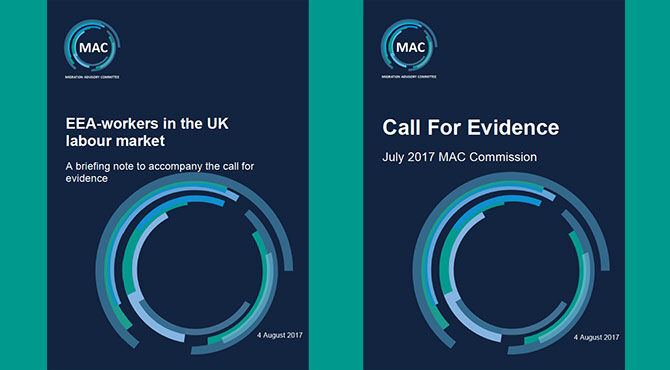MAC commission seeks evidence for post-Brexit immigration plan
Time is running out for global mobility professionals – from HR and suppliers to business leaders – to have their say on the Migration Advisory Committee’s review of post-Brexit immigration strategy.

MAC will seek evidence from stakeholders
Responding to the commission the Chair of the MAC, Professor Alan Manning, said, “This is an important and extensive commission and the MAC welcome the opportunity to contribute to the UK’s knowledge base in this area at this critical time.”“The MAC will research and analyse the areas covered by the questions using all available data sources, using both internal and external analysts and expertise. We are keen to work with stakeholders to explore the issues encompassed by this commission.”The Migration Advisory Committee is an independent public body that provides transparent, independent and evidence-based advice to the government on migration issues.The MAC has released a call for evidence, which is available on the MAC website. The MAC will engage with government, business, trade unions and other interested parties to ensure a high quality evidence based response to the commission.At the end of July, as part of the process to develop a post-Brexit immigration system, the British government ordered a yearlong assessment of the economic importance of migration from the European Union. The Migration Advisory Committee will undertake the assessment.Migration Advisory Committee documents:
- Call For Evidence July 2017 MAC Commission
- EEA-workers in the UK labour market A briefing note to accompany the call for evidence
CIPD calls for employers to respond to restrictions
The CIPD, the professional body for HR and people development, responded to this announcement by acknowledging the skills challenges that current and future migration restrictions posed for employers. Gerwyn Davies, its senior labour-market analyst, urged companies to take action to head off talent shortages.Mr Davies said, “Employers looking to hire workers from inside the EU must respond now to the prospect of migration restrictions, or face the consequences of recruitment difficulties in the future. The point is that these initiatives can take months or even years to come to fruition, so employers need to put wheels in motion now.”The CBI has responded to the latest ONS figures, which show that net migration fell by 81,000 to 246,000 in the year to March 2017.Related stories:
- Official figures confirm exodus of EU workers from UK
- Government orders probe to formulate new migration policy
- Immigration shake up requires quick response from employers
Matthew Percival, CBI head of employment, “Against the backdrop of record employment and rising skills shortages, EU nationals make a crucial contribution to UK economic growth and job creation.“This latest data reflects a trend many businesses have seen – an increase in the number of EU citizens leaving the country. The loss of these vital skills should concern us all, underlining the importance of urgently providing certainty for millions of workers and their families.”Fiona Murchie, managing editor of Relocate Global, said,“Specific industries already struggle to attract the global talent they need to drive business growth. Oil and gas, energy, pharmaceuticals, bio-med, science, technology, mining, engineering and construction, aerospace, and technology are just some of the sectors that traditionally use international assignments for project work and talent development. Many more, including technology and the creative industries, from film to gaming, rely on cross-border cooperation to compete in global markets.“Our community also embraces a wider range of employee support sectors, including schools, serviced apartments, international health, and language schools, many of which rely on specialist global expertise to keep up with demand for their services. We also welcome your views on how you think Relocate can help to pull together the arguments and provide evidence from the global mobility sector.” It is really important that you respond and help shape immigration policy for your sector. We look forward to hearing from you.
Please send your comments to editorial@relocatemagazine.com
Read David Sapsted's article on Establishing Right to Remain – which discusses the uncertainty over immigration which the UK faces following Brexit – in the Summer 2017 issue of Relocate Magazine.
For related news and features, visit our Immigration section.Access hundreds of global services and suppliers in our Online Directory
 Get access to our free Global Mobility Toolkit
Get access to our free Global Mobility Toolkit 
©2026 Re:locate magazine, published by Profile Locations, Spray Hill, Hastings Road, Lamberhurst, Kent TN3 8JB. All rights reserved. This publication (or any part thereof) may not be reproduced in any form without the prior written permission of Profile Locations. Profile Locations accepts no liability for the accuracy of the contents or any opinions expressed herein.

























